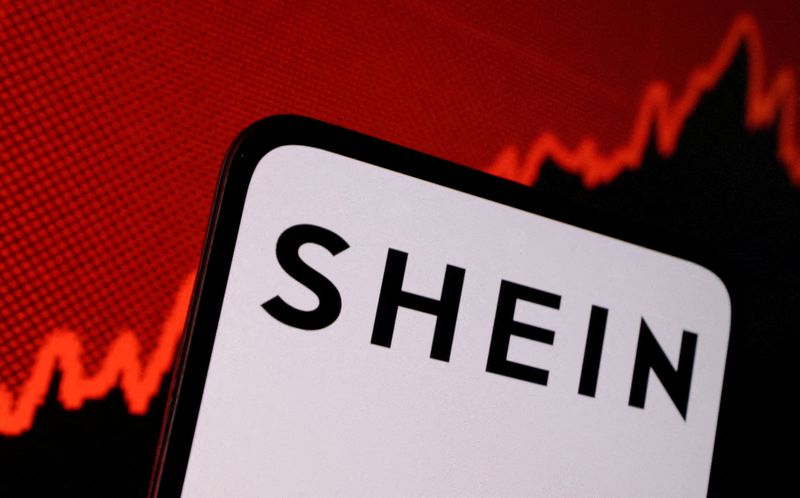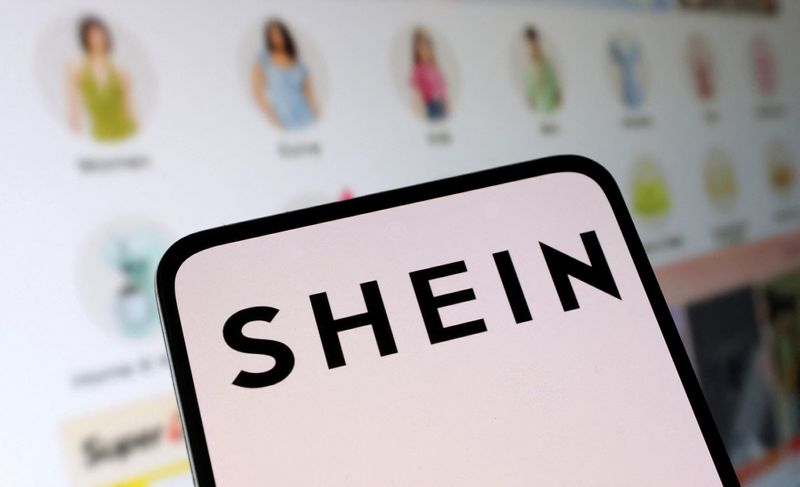By Helen Reid
LONDON (Reuters) - Britain's financial regulator is taking longer than usual to approve fast-fashion retailer Shein's IPO because it is checking its supply chain oversight and assessing legal risks after an advocacy group for China's Uyghur population challenged the listing, according to two sources close to the matter.
Britain's Independent (LON:IOG) Anti-Slavery Commissioner, a monitoring body of the interior ministry, has also raised concerns within government over a Shein IPO because of allegations about labour practices at its suppliers.
Singapore-headquartered Shein, which sells $5 tops and $10 dresses mostly made in China in 150 markets worldwide, filed confidentially with the Financial Conduct Authority in early June for a London listing.
Shein is also awaiting approval from China's securities regulator for its London IPO, two separate sources said, adding that the approval would likely come after the FCA's decision.
The advocacy group, Stop Uyghur Genocide (SUG), announced a legal challenge in June and sent the FCA a dossier in August alleging that Shein uses cotton from China's Xinjiang region.
The U.S. and NGOs have long accused China of human rights abuses in the Xinjiang Uyghur Autonomous Region, where they say Uyghurs are forced to work producing cotton and other goods.
Beijing has denied any abuses.
Shein declined to reply to Reuters' questions about the FCA process. Shein has a zero-tolerance policy for forced labour and is committed to respecting human rights, a spokesperson for the company has said.
The company last week announced a global external ESG advisory board to bolster its governance.
In a sustainability report published in August, Shein said it found two cases of child labour in its supply chain in 2023, and no cases of forced labour. Like Primark and other apparel retailers, Shein uses isotopic testing service Oritain to verify the origin of its cotton, which accounts for 9.9% of the textiles in Shein-branded products.
The FCA declined to comment on the listing and any delays. A spokesperson for the FCA said timelines for IPO approval depend on each individual case. Market experts say it usually takes several months to reach a decision.
The FCA is under no obligation to assess evidence presented by civil society groups, and will generally let investors take their own position, said Lorna Emson, partner at law firm Macfarlanes. If it did find compliance concerns, it would tend to address these confidentially with the company itself.
But NGO pressure is unlikely to fade.
"Regulators are being given more to think about – and are required to do so under the watchful scrutiny of the increasingly well-funded and litigious NGO and activist community," said Lucy Blake, partner at law firm Jenner & Block.
NGOs are not alone in raising concern over Shein's IPO.
The Independent Anti-Slavery Commissioner wrote to the Home Office and Department for Business in June about the IPO, according to previously unreported letters obtained by Reuters through a Freedom of Information request.
"Encouraging a company like Shein to float on the UK market inadvertently implies endorsement of poor labour practices and the prioritisation of attracting business to the UK over human rights abuses," Commissioner Eleanor Lyons wrote.
The Home Office and Department for Business jointly replied that the FCA decides independently on listings and the UK has rules to guard against modern slavery.
Like other retailers, Shein must comply with incoming European Union regulations on forced labour and the Uyghur Forced Labor Prevention Act in the U.S., both of which are considered stronger than Britain's Modern Slavery Act.
JUDICIAL REVIEW?
The FCA, which recently simplified its listing rules, faces pressure from the five-month-old Labour government to end an IPO drought.
Britain's finance minister Rachel Reeves in mid-November told the FCA in a letter that she wants to ensure "innovative new firms are supported to enter the market". Reeves also said regulation should be less risk-averse and more focused on growth.
The FCA must assess Shein's governance and ensure its disclosures are bulletproof in the likely event that SUG applies for a judicial review of an IPO approval, a regulatory lawyer told Reuters, speaking on condition of anonymity.
The FCA declined to comment on SUG's legal challenge or the likelihood of a judicial review application.
SUG executive director Rahima Mahmut told Reuters she was meeting with lawyers this week to discuss next steps.
ClientEarth, an NGO, last year applied for judicial review of the FCA's decision to approve the IPO of oil and gas producer Ithaca Energy (LON:ITH), alleging its prospectus inadequately described climate risks, but the High Court refused the application.
In this case too, some lawyers think a judicial review application by SUG would fail.
For Shein, valued at $66 billion in a fundraising round last year, its IPO performance will partly hinge on what risks the FCA decides it must include in its prospectus, and how those are priced in.

Worker exploitation has been rife in supply chains of retailers and brands around the world, not just in low-cost fashion but also in luxury.
Shein's revenues are expected to hit $50 billion this year, up 55% from 2023 according to Coresight Research.
